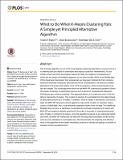What to Do When K-Means Clustering Fails: A Simple yet Principled Alternative Algorithm
Author(s)
Raykov, Yordan P.; Boukouvalas, Alexis; Baig, Fahd; Little, Max
DownloadRaykov-2016-What to Do When K-Means Clustering.pdf (3.449Mb)
PUBLISHER_CC
Publisher with Creative Commons License
Creative Commons Attribution
Terms of use
Metadata
Show full item recordAbstract
The K-means algorithm is one of the most popular clustering algorithms in current use as it is relatively fast yet simple to understand and deploy in practice. Nevertheless, its use entails certain restrictive assumptions about the data, the negative consequences of which are not always immediately apparent, as we demonstrate. While more flexible algorithms have been developed, their widespread use has been hindered by their computational and technical complexity. Motivated by these considerations, we present a flexible alternative to K-means that relaxes most of the assumptions, whilst remaining almost as fast and simple. This novel algorithm which we call MAP-DP (maximum a-posteriori Dirichlet process mixtures), is statistically rigorous as it is based on nonparametric Bayesian Dirichlet process mixture modeling. This approach allows us to overcome most of the limitations imposed by K-means. The number of clusters K is estimated from the data instead of being fixed a-priori as in K-means. In addition, while K-means is restricted to continuous data, the MAP-DP framework can be applied to many kinds of data, for example, binary, count or ordinal data. Also, it can efficiently separate outliers from the data. This additional flexibility does not incur a significant computational overhead compared to K-means with MAP-DP convergence typically achieved in the order of seconds for many practical problems. Finally, in contrast to K-means, since the algorithm is based on an underlying statistical model, the MAP-DP framework can deal with missing data and enables model testing such as cross validation in a principled way. We demonstrate the simplicity and effectiveness of this algorithm on the health informatics problem of clinical sub-typing in a cluster of diseases known as parkinsonism.
Date issued
2016-09Department
Program in Media Arts and Sciences (Massachusetts Institute of Technology)Journal
PLOS ONE
Publisher
Public Library of Science
Citation
Raykov, Yordan P.; Boukouvalas, Alexis; Baig, Fahd and Little, Max A. “What to Do When K-Means Clustering Fails: A Simple yet Principled Alternative Algorithm.” Edited by Byung-Jun Yoon. PLOS ONE 11, no. 9 (September 2016): e0162259. © 2016 Raykov et al
Version: Final published version
ISSN
1932-6203